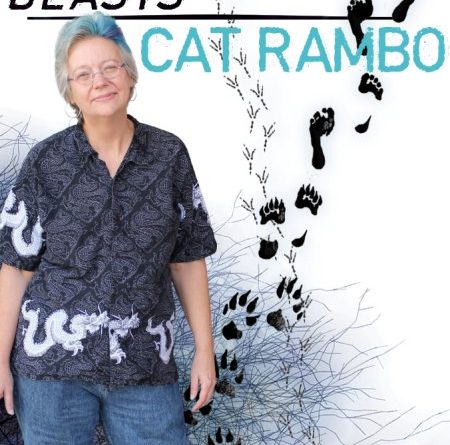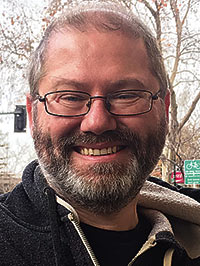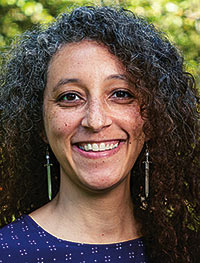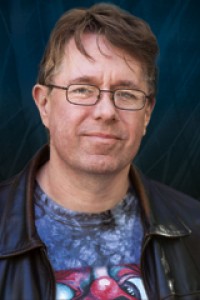Cat Rambo: Beasts
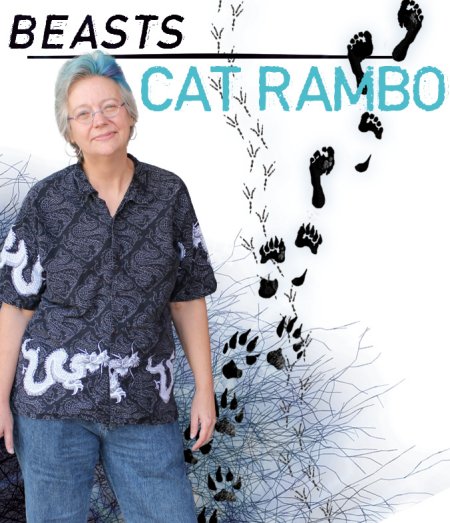
Cat Rambo was born Catherine Ann Francis on November 14, 1963 in College Station TX, and grew up in South Bend IN. She attended Indiana University for a year, then went to work in a bookshop, returning to college at the University of Notre Dame and graduating with an English degree and a certificate in Gender Studies. She earned a Master’s from the Writing Seminars Johns Hopkins University, and began a PhD program at Indiana University before leaving to pursue a career in computer security. She worked in New York for a time before settling in Seattle to work for Microsoft. Rambo helped create and run online roleplaying game Armageddon MUD for many years. She married Wayne Rambo in 2003, and changed her name to Catherine Tigerlily Rambo in 2004.
In 2005 she quit her job to focus on writing, attending Clarion West that summer. She now writes full time, and frequently teaches writing classes. From 2007-2011 she co-edited Fantasy Magazine, and was shortlisted for a World Fantasy Award for her work with the magazine in 2012.
Rambo has been active in SFWA since 2005. She served as vice-president in 2014, and began her term as president in 2015. With Fran Wilde she co-edited Ad Astra: the SFWA 50th Anniversary Cookbook (2015).
While in graduate school, she published short fiction in literary journals, and began publishing work of genre interest in the early 2000s. ‘‘Five Ways to Fall in Love on Planet Porcelain’’ (2012) was a Nebula Award finalist. A collection in collaboration with Jeff VanderMeer, The Surgeon’s Tale and Other Stories, appeared in 2007. Her other collections include Eyes Like Sky and Coal and Moonlight (2009), Near + Far (2012), and Altered America: Steampunk Stories (2016). Collection Neither Here Nor There is forthcoming. Debut novel Beasts of Tabat (2015) launched the Tabat Quartet, with sequel Hearts of Tabat appearing in early 2017.
Excerpts from the interview:
‘‘Most of my science fiction is near-future. In some ways it’s just urban fantasy. Part of the genre thing is about where to shelve them in bookstores, and the boundaries dissolve to a certain extent. I’m thinking about Walter Farley’s Black Stallion novels. The Black Stallion was clearly a horse above all others, and super intelligent. Were those fantasy books?
‘‘My novel Beasts of Tabat came out from Word- Fire Press last year. It’s set in a world I’ve been working in for about a decade, and I’ve written a lot of short stories in it. It’s set in a specific seaport that I originally wrote for a game, which never manifested. I was so frustrated that it didn’t get used that I ended up writing stories in the setting, because I knew it very well. I’d even mapped it out. The book’s set in a city where there are humans, and there are intelligent magical creatures who form their own class, called beasts, and then there are the other animals that are unintelligent. Beasts are considered to be, by virtue of the natural order, subordinate to humans. They’re in a system that depends on them for labor, and which also literally consumes them, in that their bodies are often used for magical spells. In fact, a lot of the human magic depends on the consumption of beasts. The book takes place at a time when that system is getting questioned. The city is about to change political systems due to an ancient prophecy, and everybody is trying to be part of the party that comes out on top. The shapeshifters are a group that nobody likes because they are terrifying, in that they can pass. They can pass as beasts, or they can pass as humans, so they are vilified by all sides. One of the main characters of the book is a shapeshifter who thought he was safe, and is not.”
…
‘‘My house was full of books growing up, and unrestricted reading. My parents let us do as we will, wandering through the shelves. I was a voracious reader. I read a lot of stuff that I’m sure flew over my head –- you know, reading Faulkner to see if there was anything interesting in it. At 12, you don’t know what a lot of it means. Things are just happening. I had the dubious honor of having a teacher haul me down to the principal’s office at one point to tell me that if he caught me reading in his class again, there would be issues. It was because I was so bored, I was sitting back there reading science fiction hidden inside the social studies textbook. I was reading Robert Heinlein and Andre Norton, all the juveniles that I could, because it was 5th or 6th grade. I got good at having a look of fixed interest whenever the teacher glanced at me.”
…
‘‘The genre field is so much more rewarding to work in for me, personally, in many ways. It is a much friendlier place than literary fiction. People are much more invested in the idea of paying it forward. I don’t mean to diss literary fiction – I love literary fiction, and many of the writers. I love John Barth with all my heart and always will. But genre writers just take care of their own in fandom, in general. This is a community that is super kind, or at least tries to be. Coming into this community was like discovering the tribe I’d somehow gotten separated from years ago. I wish I’d found it much sooner – it would have changed my life. Here’s a basic division between the current small literary magazines and the current science fiction magazines. Most of the literary magazines make you pay to submit. It is a practice that is increasingly common and increasingly accepted. To me the idea that writers should be paying to submit or writing for exposure is ridiculous. Literary magazines have always been very slow to reply, too. When I was sending to them, you could wait a year or two for a reply.
‘‘I feel slightly more easy in fantasy than science fiction, simply because I don’t have a strong science background. I’m not a math person, so hard science fiction is probably a genre you will never see me dabble in. I’ve always been a really omnivorous reader, and my output ends up being along the same lines, because I just write stories. Story ideas come from all around – from art that I look at, from walking down the street and seeing things, and from what I read, too. I’m working on a non-fiction book right now that comes out of a class I just finished teaching, called ‘Moving from Idea to Draft’. As part of class preparation, I went and figured out how stories started for me, and I found two dozen different beginnings. They could be a scene, or a title. Sometimes stories start with a character.”
…
‘‘I qualified for SFWA in 2005. I tried to join. They lost my application but cashed my check. That doesn’t happen anymore. I contacted Vonda McIntyre and said, ‘I don’t know what’s going on. These people took my money.’ Vonda, God bless her, sorted it all out. I became a member. As I had been instructed to do by Ann Crispin, I immediately volunteered. It’s not so much that I like to volunteer – it’s that inefficiency and bad processes drive me nuts. With the game I worked on, I’d joined as a player and worked my way up. In many ways, Armageddon MUD was the best preparation for running SFWA that I could have had. Armageddon was what we called ‘roleplay required.’ You ran your character, and you could never break character. We had permanent death, which means when your character died, you made a new character. Over the course of 15 years I dealt with many people who had run a character for years and had it die and were very angry about that. I introduced some changes that made the game more welcoming for female players and we had a better proportion of female players and female staff than any other game like that.
‘‘My experience as a manager at Microsoft also helped me with SFWA. One of the things we’re doing very well now is that we have a number of people with corporate experience, because SFWA is now a nonprofit corporation. It is a vast amount of work. It is one of those jobs that will consume as much time as you can possibly fling at it. Part of the job is preventing the beast from devouring all your life. I love it in many ways. I absolutely adore the team. I’m working with an amazingly high powered team. Kate Baker, Maggie Hogarth, and Bud Sparhawk are all amazing. It certainly does cut into my writing time. There are stressful things, but any job is going to have a certain amount of stress. I can’t say I’m not looking forward to waking up and not thinking about SFWA someday. I try to get in 1,000 words of writing before I open my e-mail. I’m in Seattle, so the sun’s up around four in the morning in the summer, and I’m up by five or six.
Read the complete interview in the November 2016 issue of Locus Magazine. Interview design by Francesca Myman.


